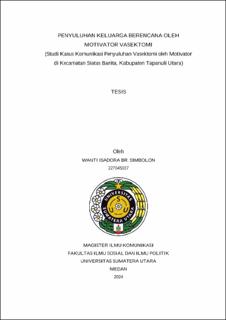Penyuluhan Keluarga Berencana oleh Motivator Vasektomi (Studi Kasus Komunikasi Penyuluhan Vasektomi oleh Motivator di Kecamatan Siatas Barita, Kabupaten Tapanuli Utara)
Family Planning Extension by Vasectomy Motivators (Case Study of Vasectomy Extension Communication by Motivators in Siatas Barita District, North Tapanuli Regency)

Date
2024Author
Simbolon, Wanti Isadora Br
Advisor(s)
Mazdalifah
Khairifa, Feni
Metadata
Show full item recordAbstract
This study aims to analyze extension communication, barriers and efforts in overcoming
barriers by vasectomy motivators to prospective vasectomy acceptors in Siatas Barita
district, North Tapanuli regency using the theories of extension communication,
intercultural communication, and innovation adoption. This research uses a qualitative
method with a case study approach, with data collection methods through interviews and
observations. The informants in this study are 5 (five) people, consisting of vasectomy
motivators, family planning extension workers, vasectomy participants and OPD KB.
The results showed that the vasectomy motivator in Siatas Barita sub-district fulfilled the
three requirements as a communicator in vasectomy counseling, namely credibility,
attractiveness, and power. The communication was conducted face-to-face and used the
technique of humor to break the ice. Some of the obstacles encountered in the extension
program are that prospective acceptors have not received clear information about
vasectomy, but they perceive and interpret vasectomy as a negative condition, the close
relationship between Batak culture and gender and patriarchal culture that causes low
male family planning participation, and the wife's view that husbands who have been
vasectomized will be free to have sexual relations with other people. Interrelated
religious, cultural and gender perceptions ar.e contributing factors to low vasectomy
participation. Discussions about vasectomy should not only focus on its consequences
and benefits for men, but it is also important to consider its impact on women's
reproductive health.
Collections
- Master Theses [362]
